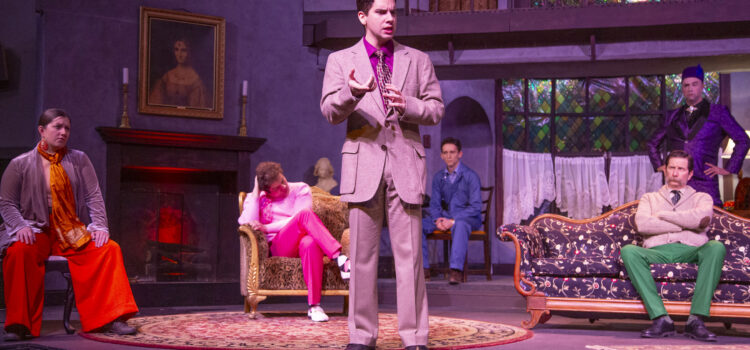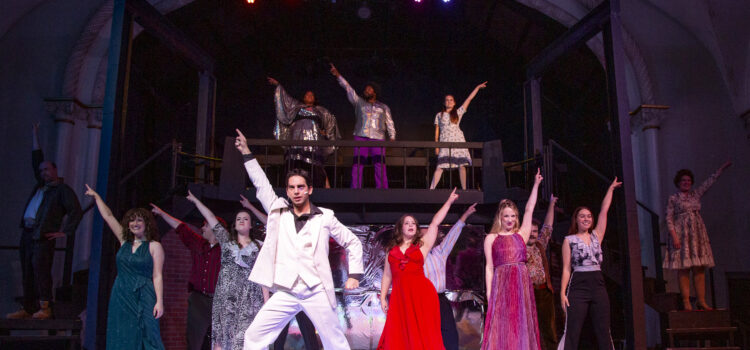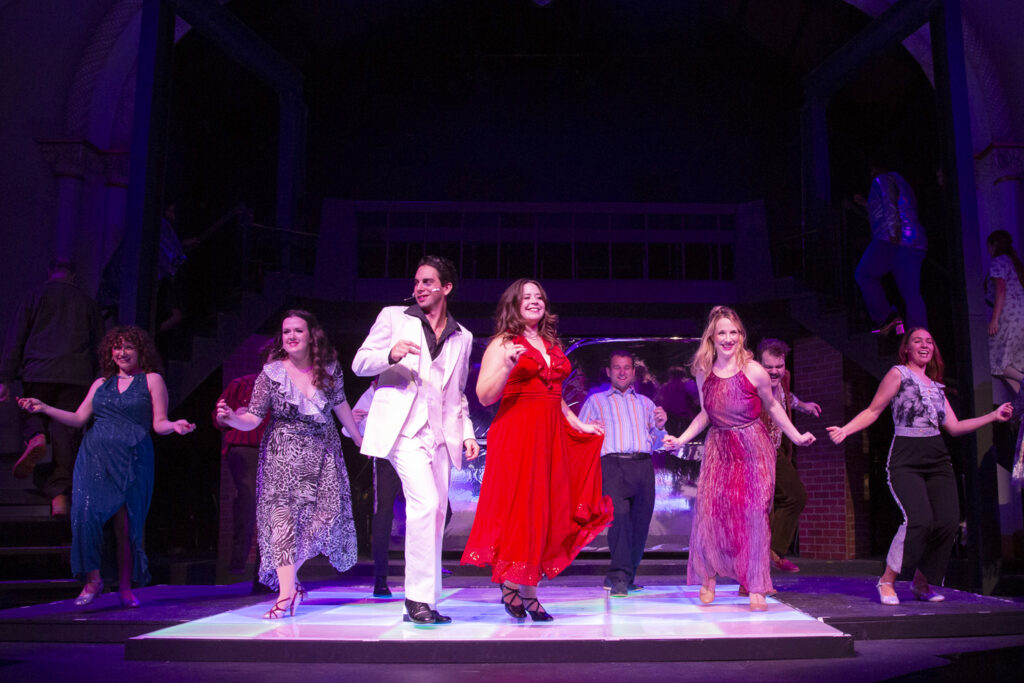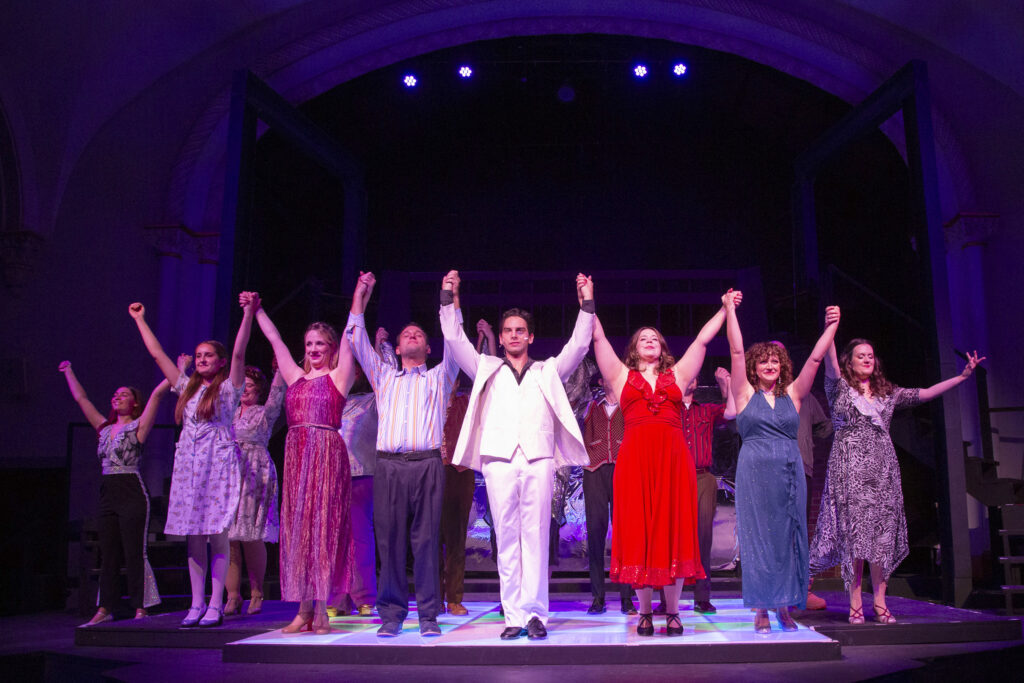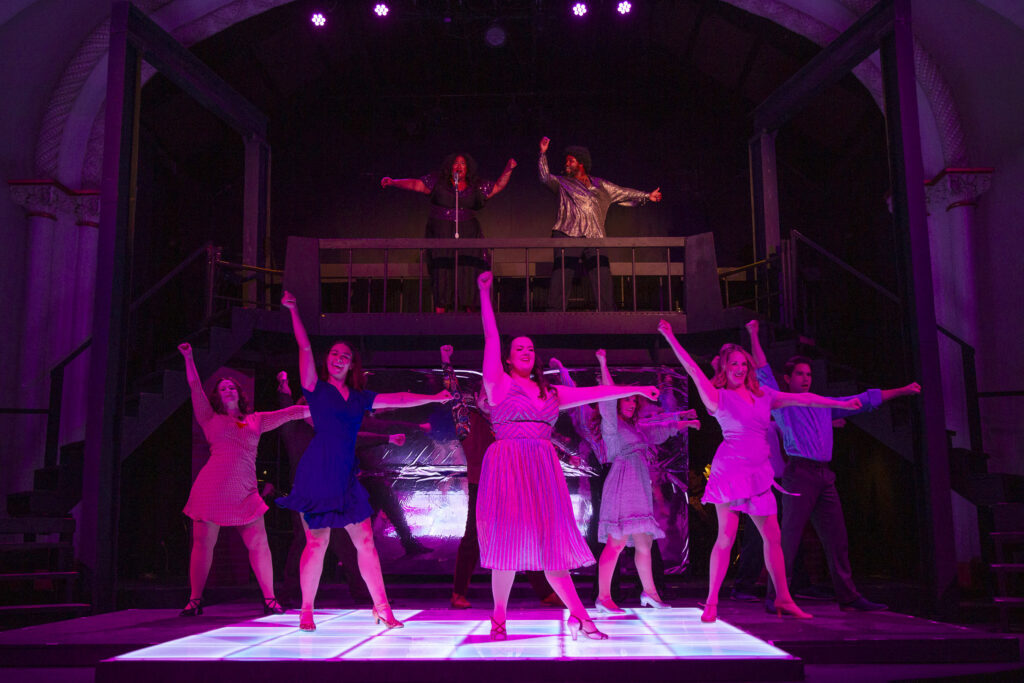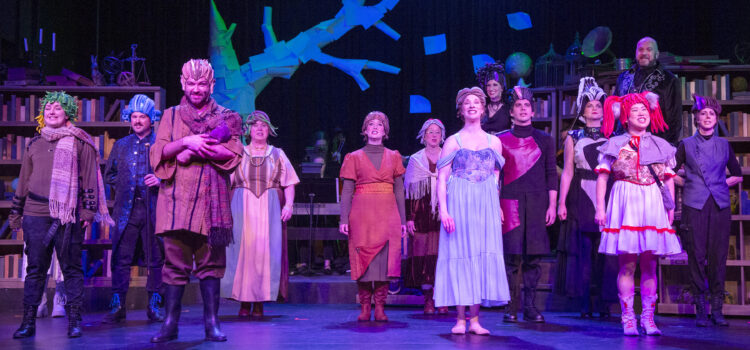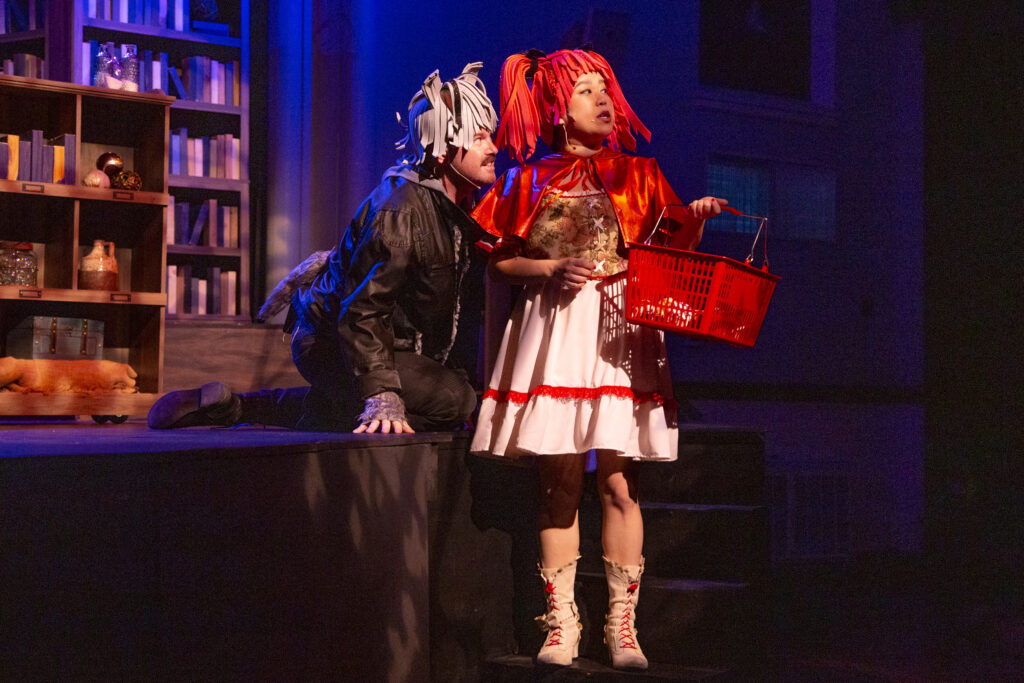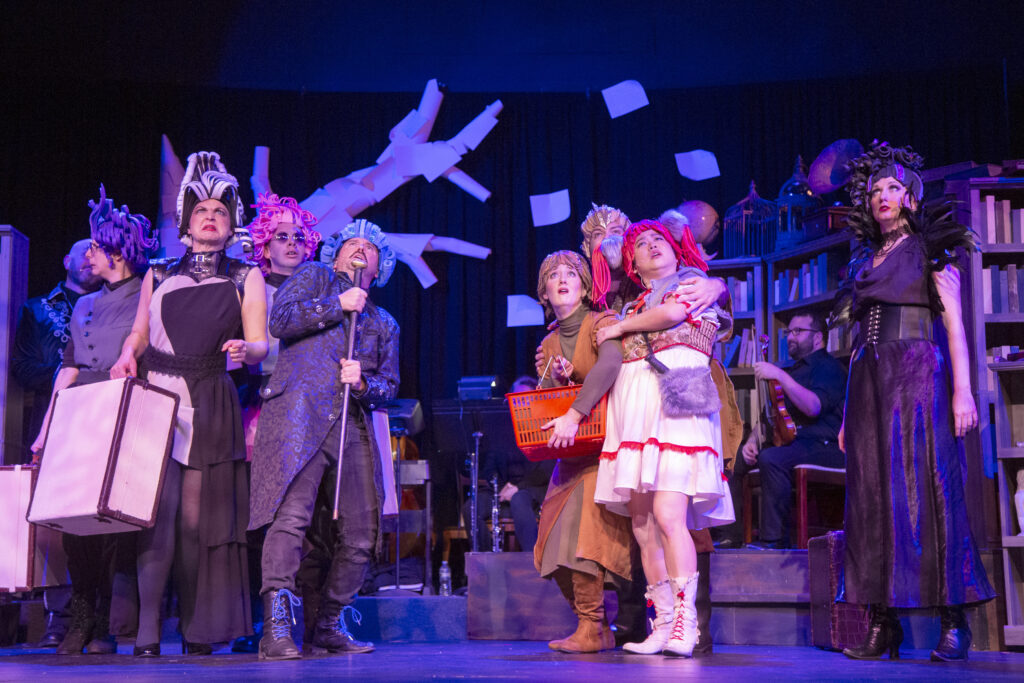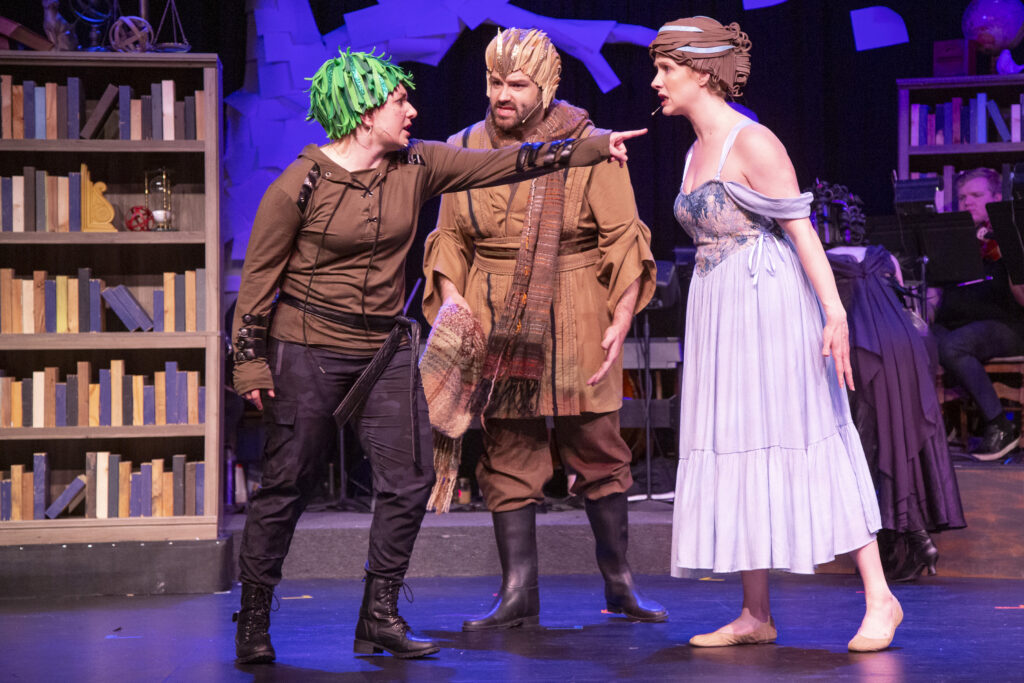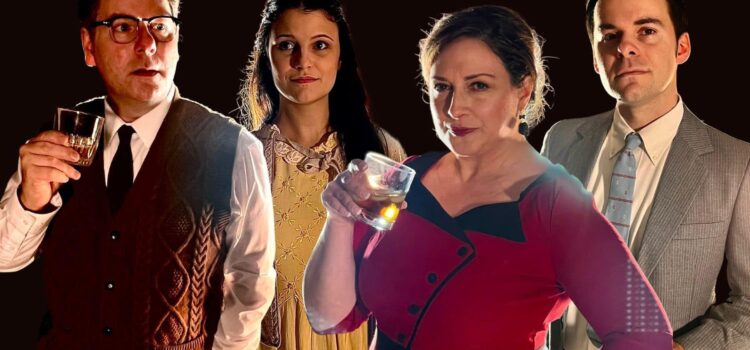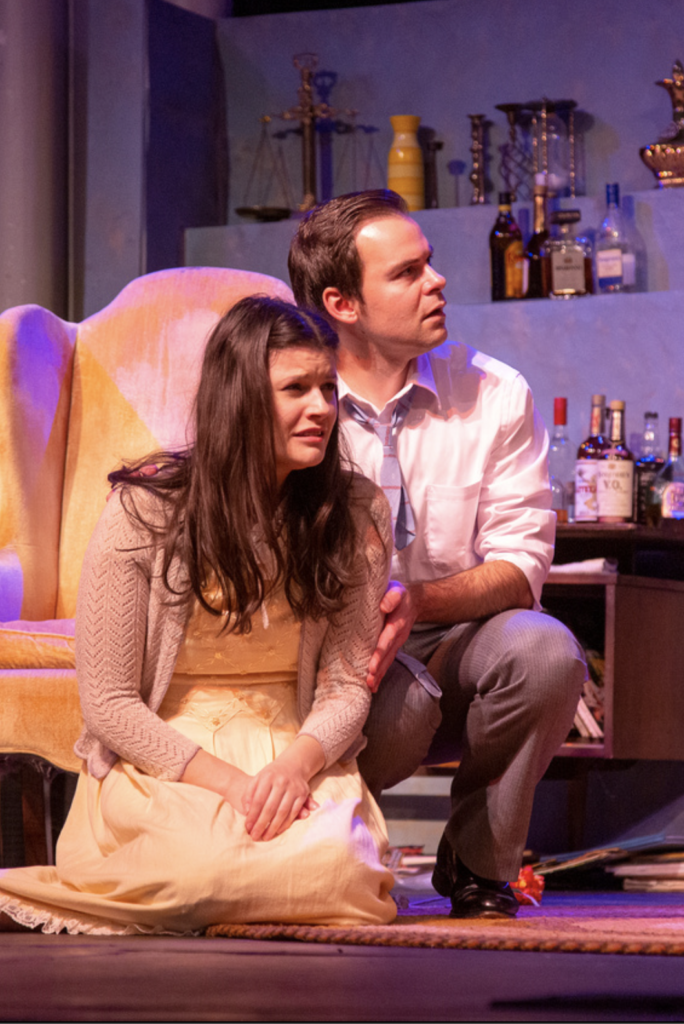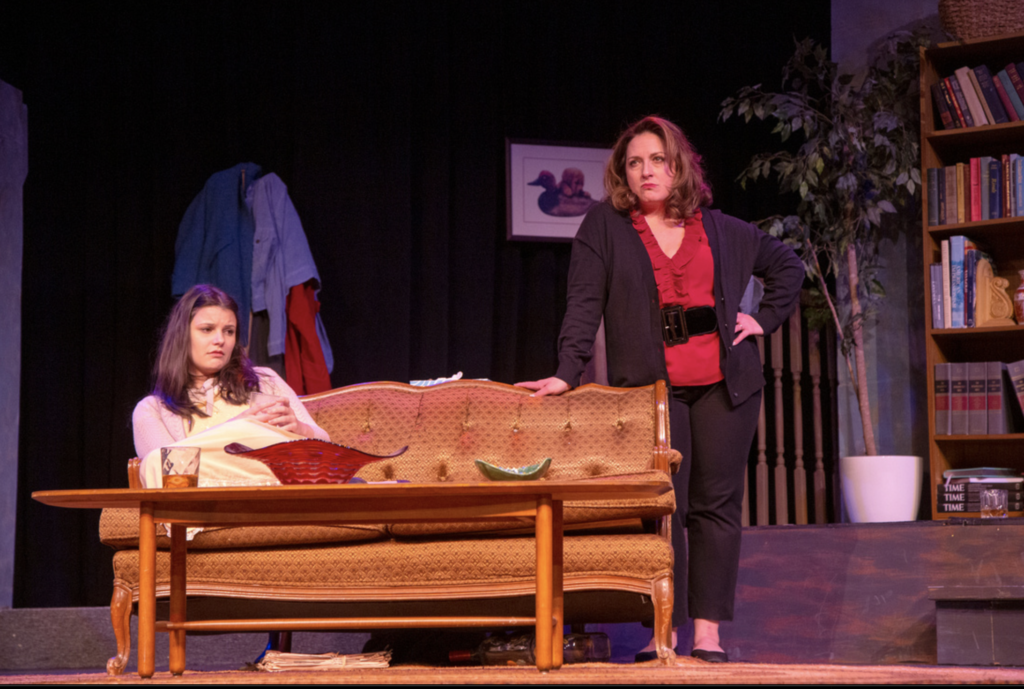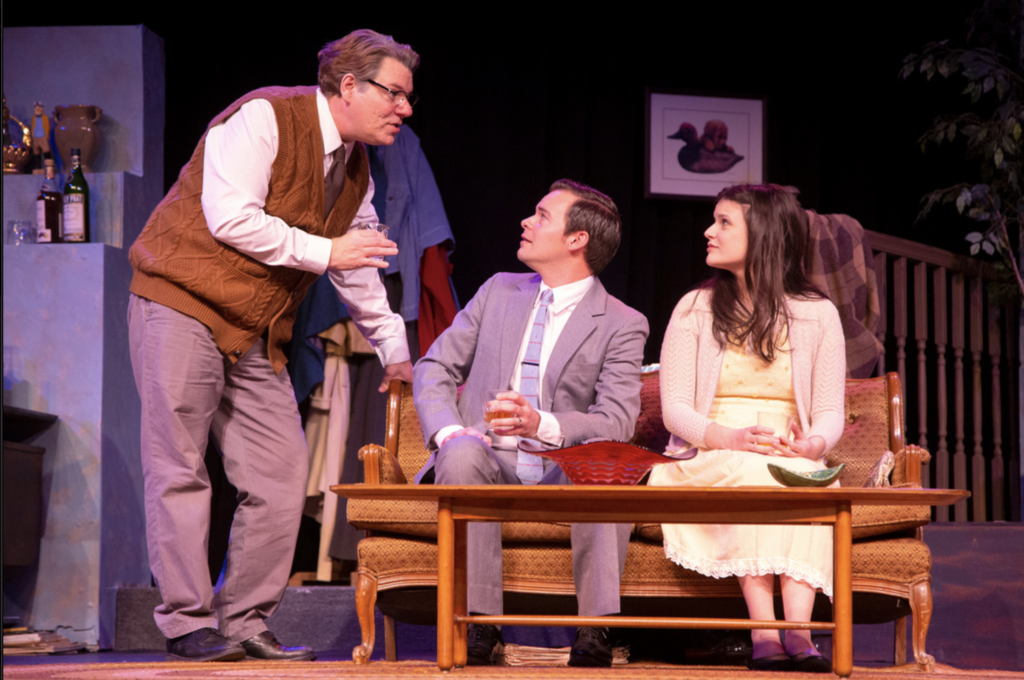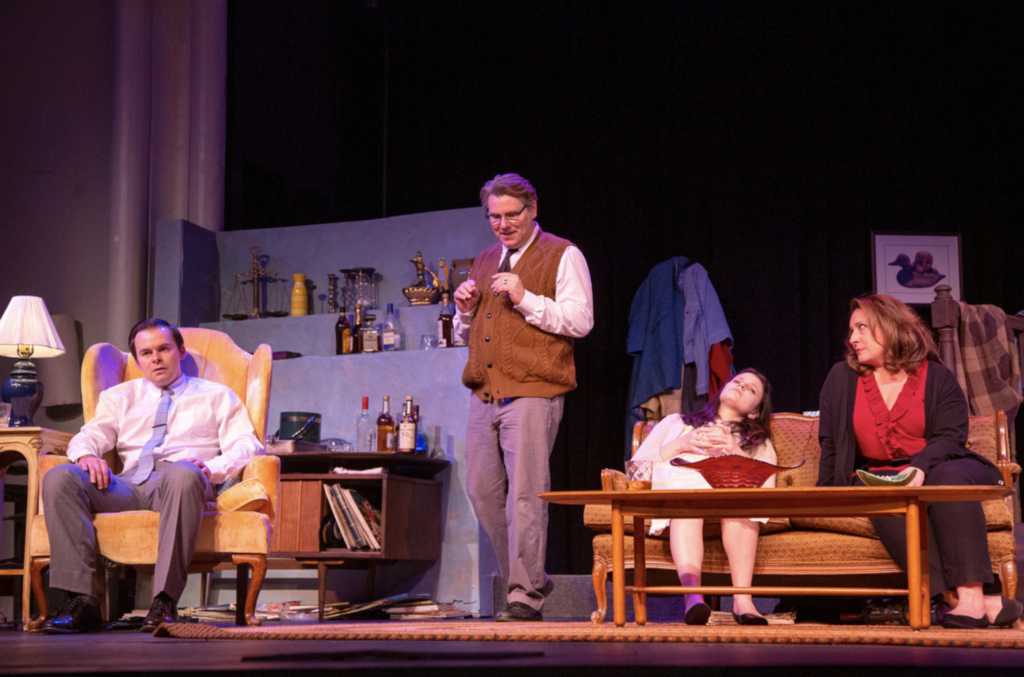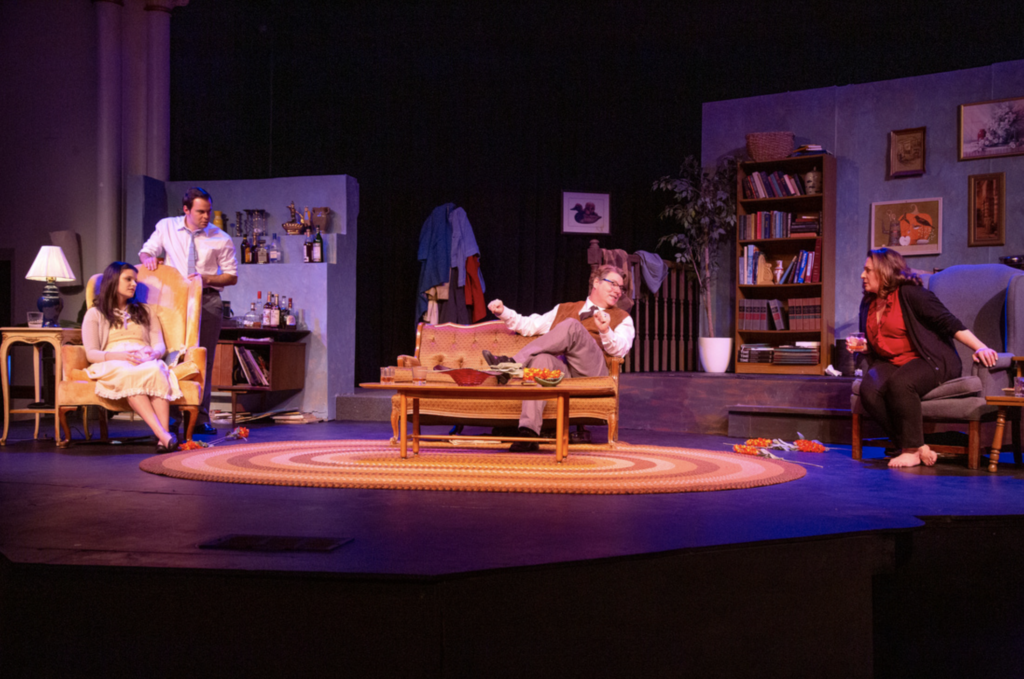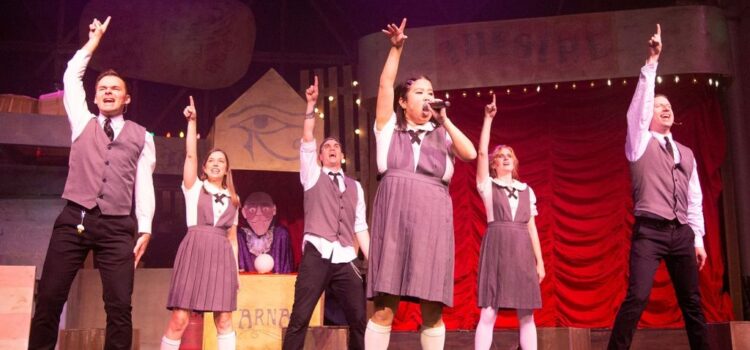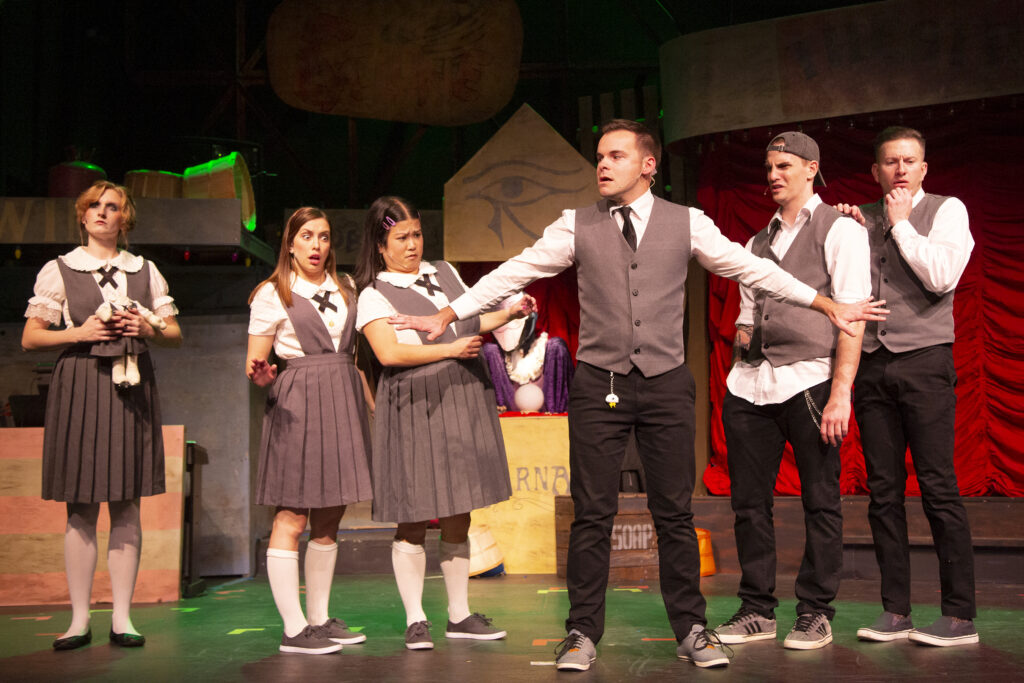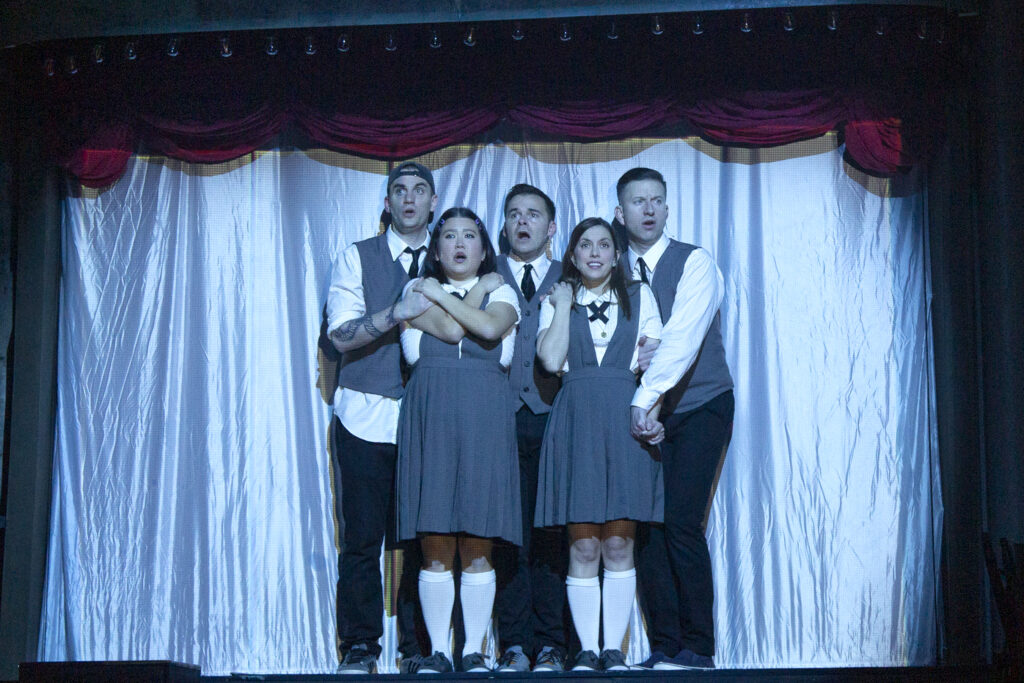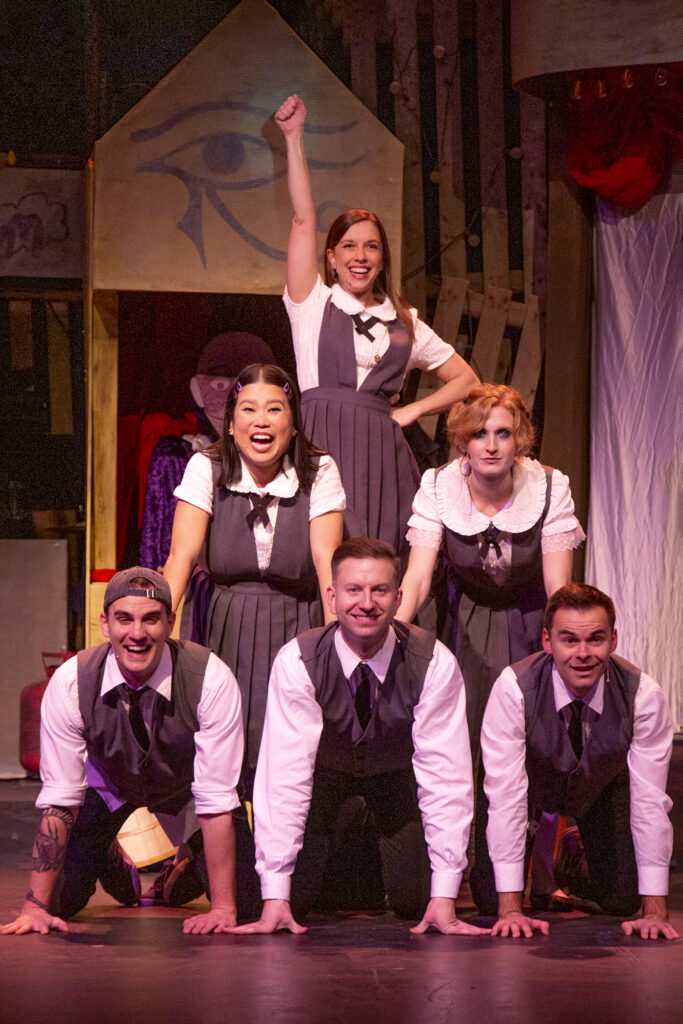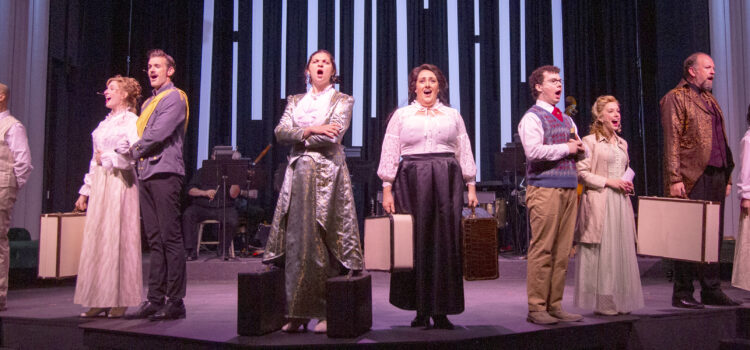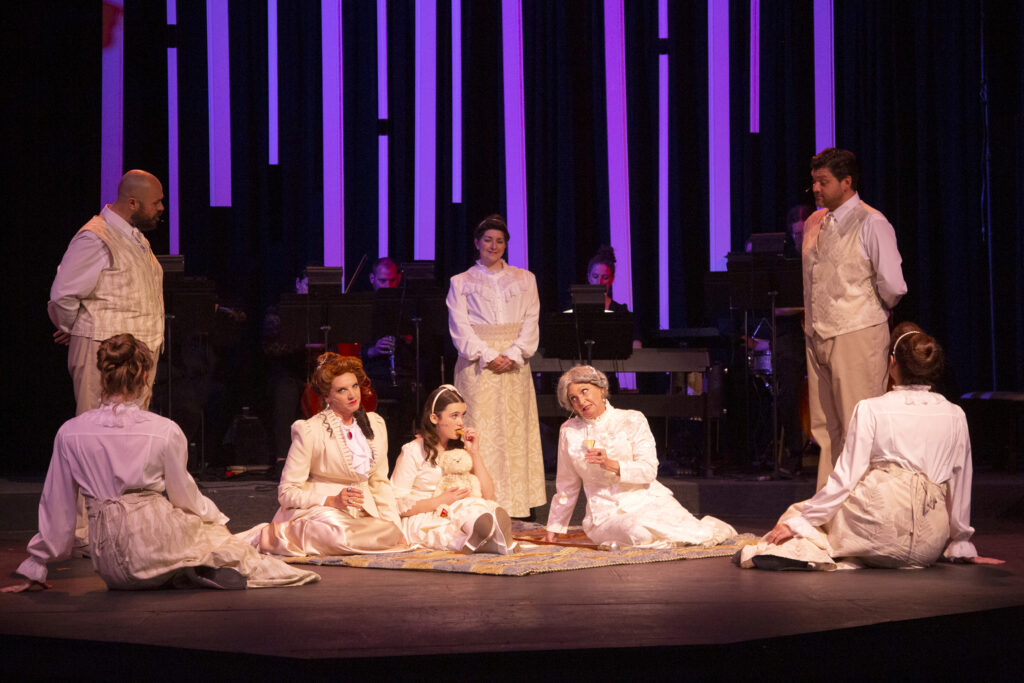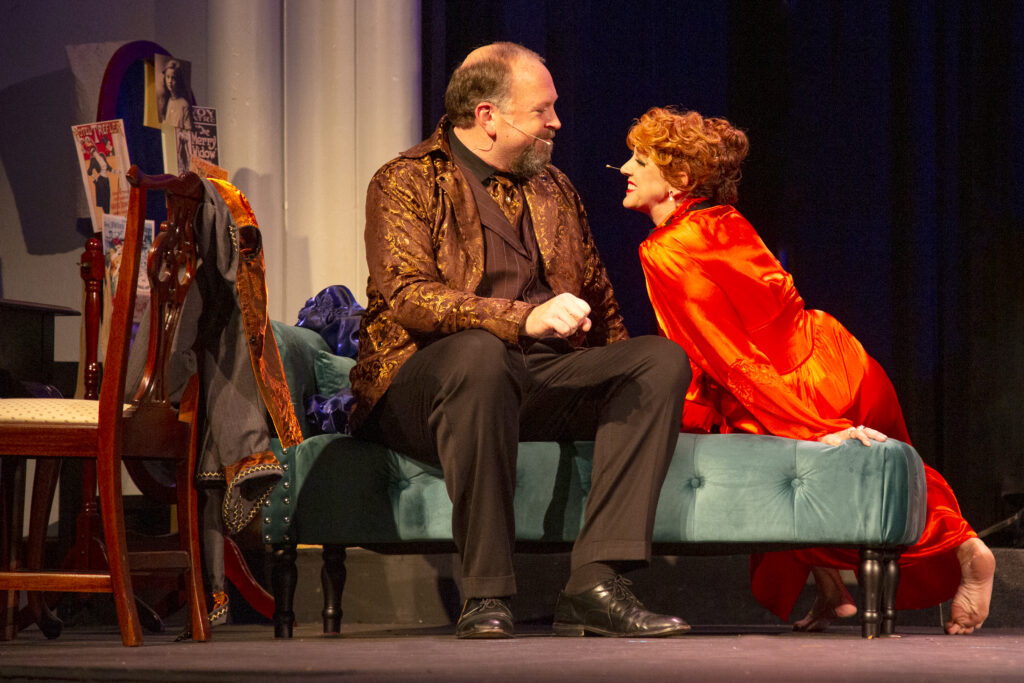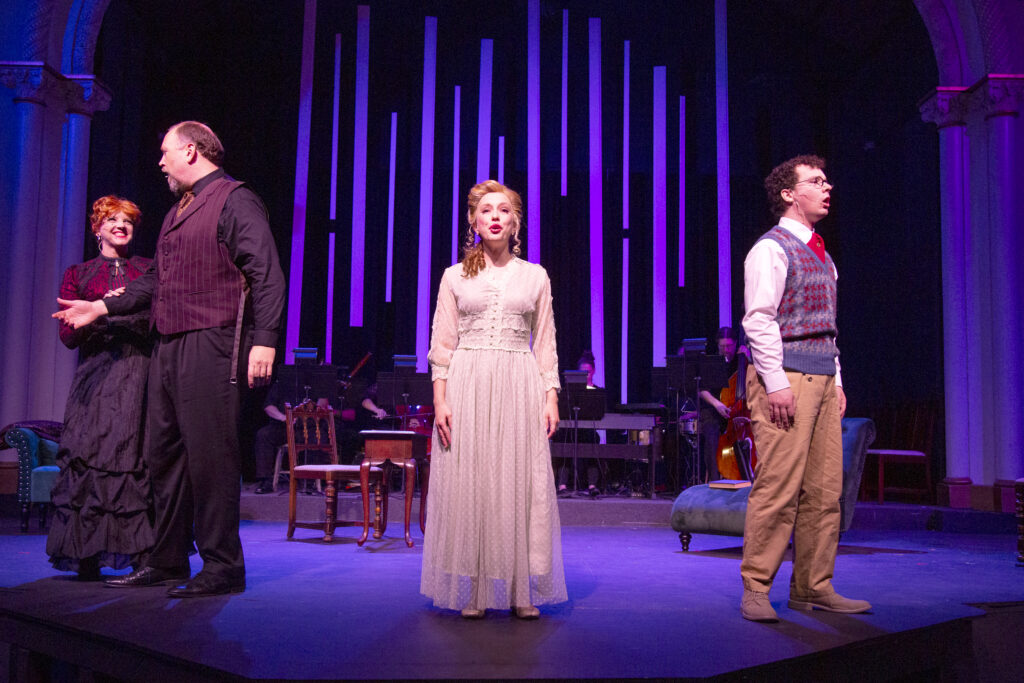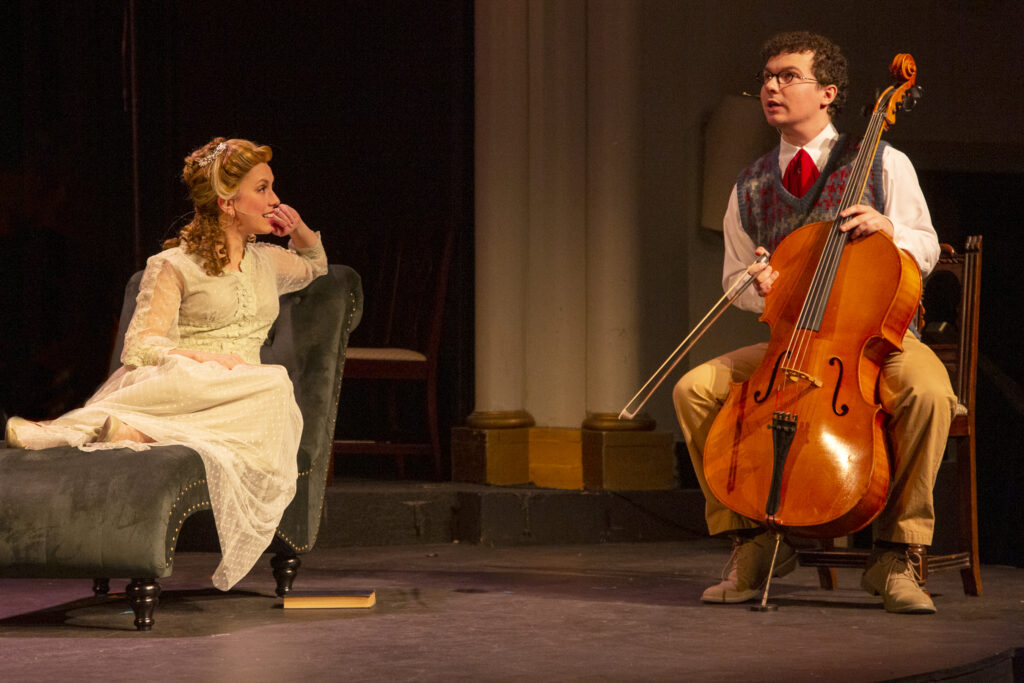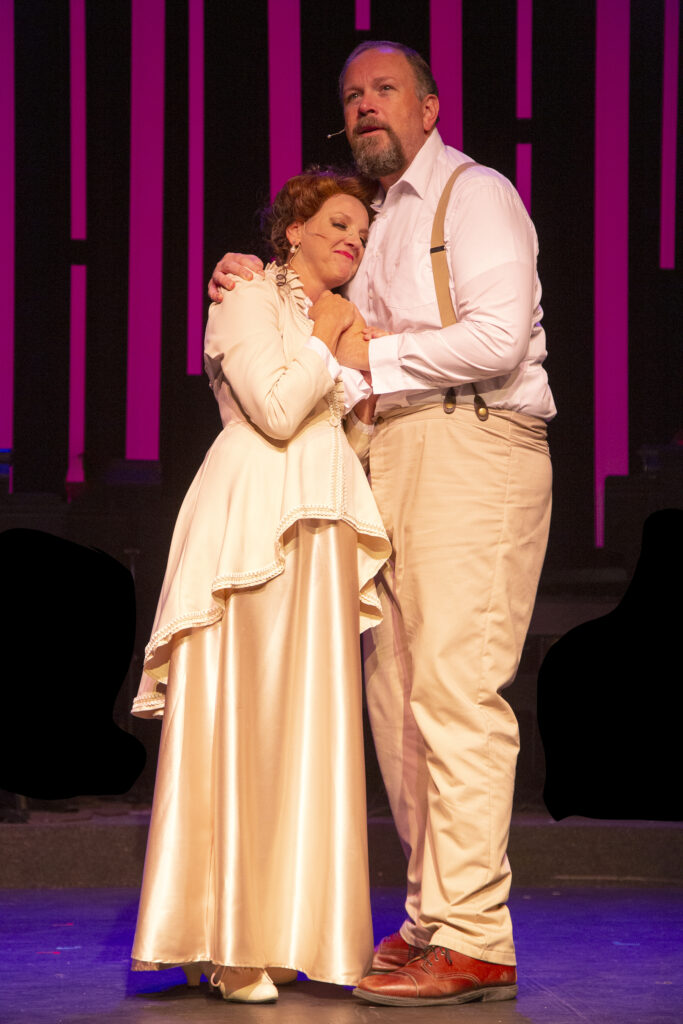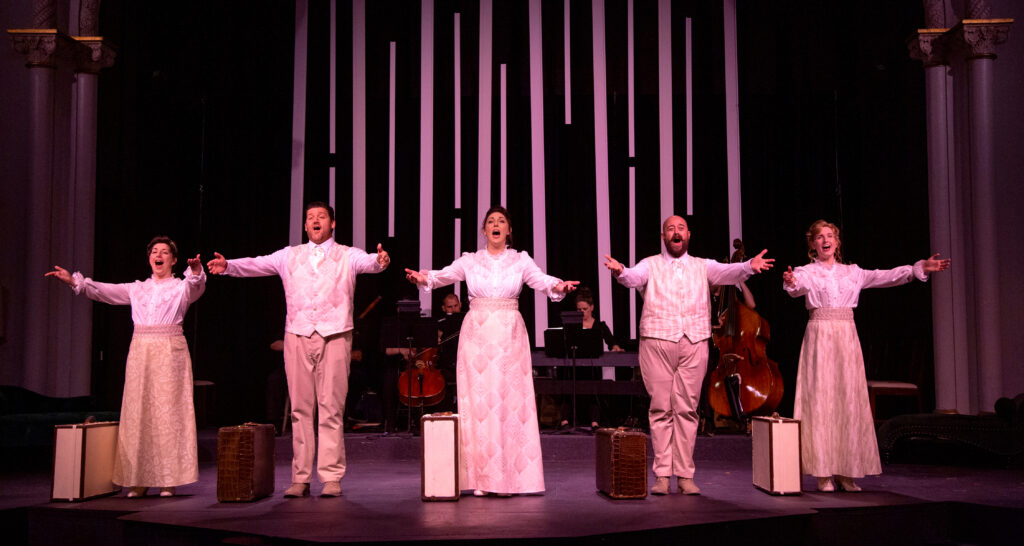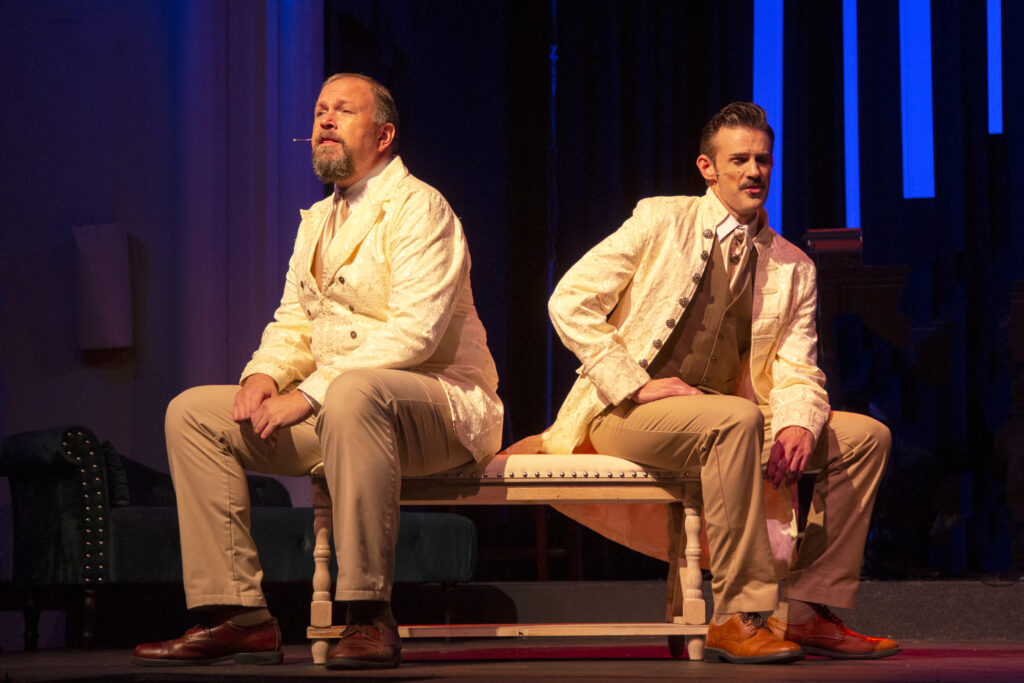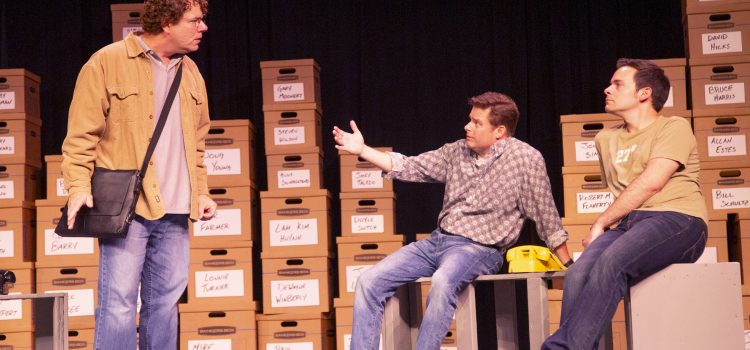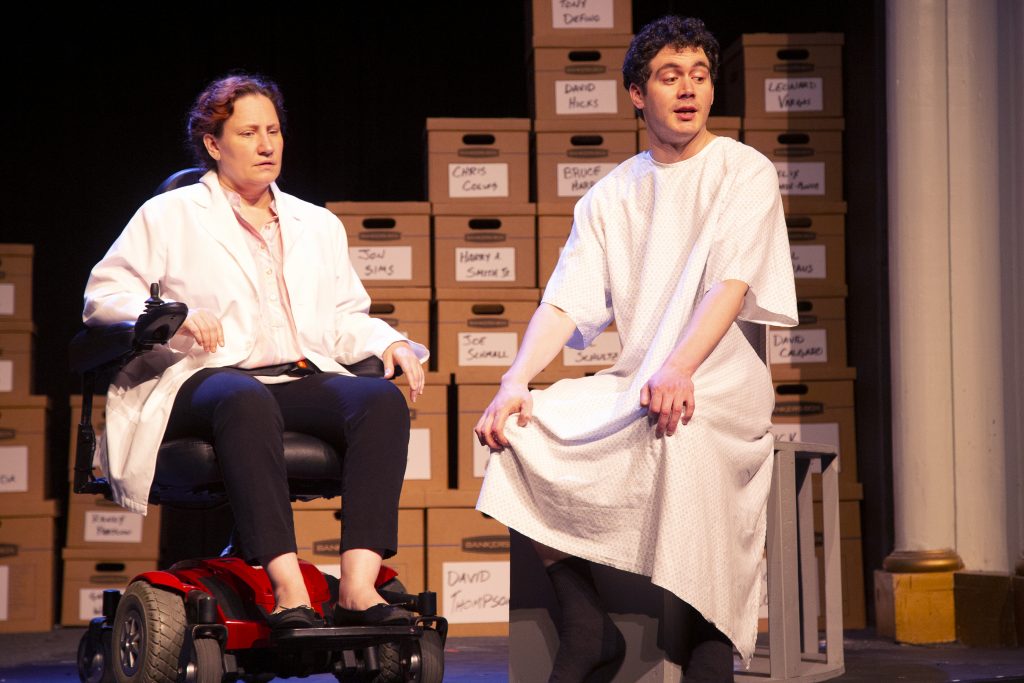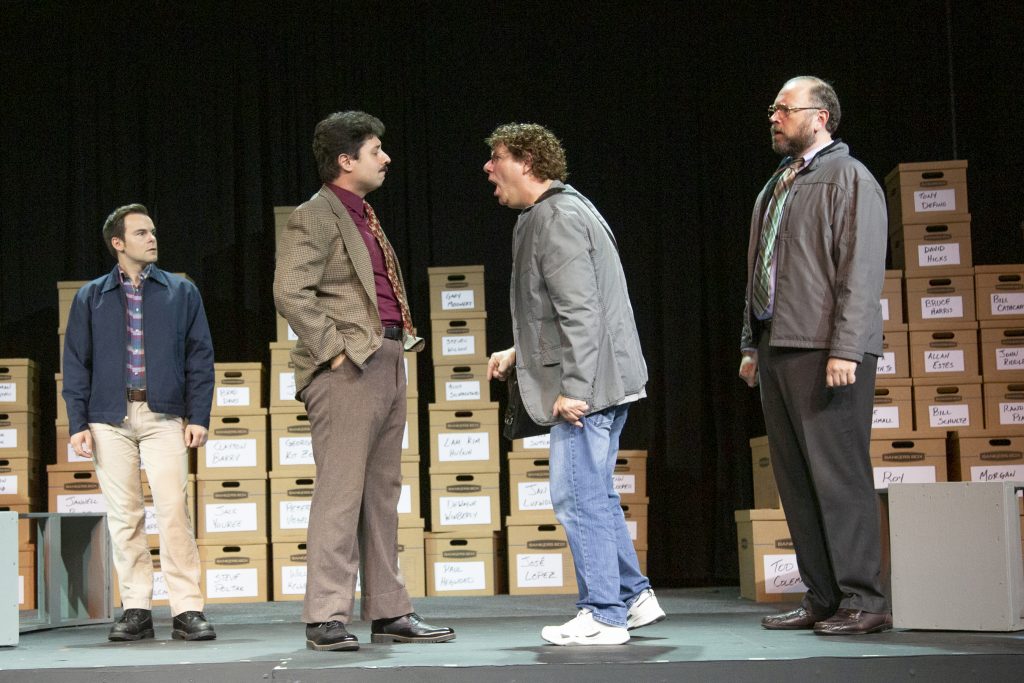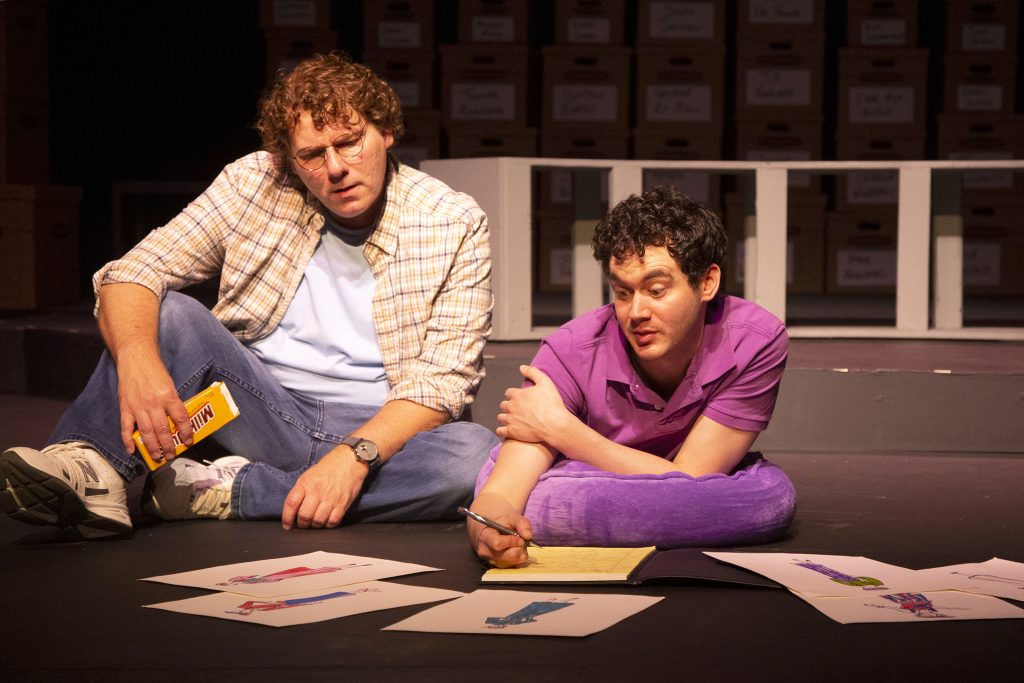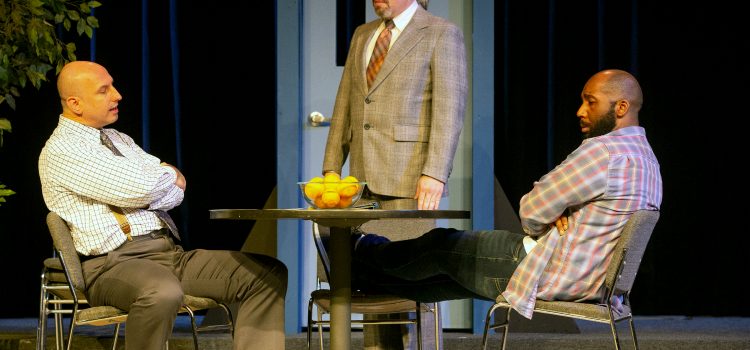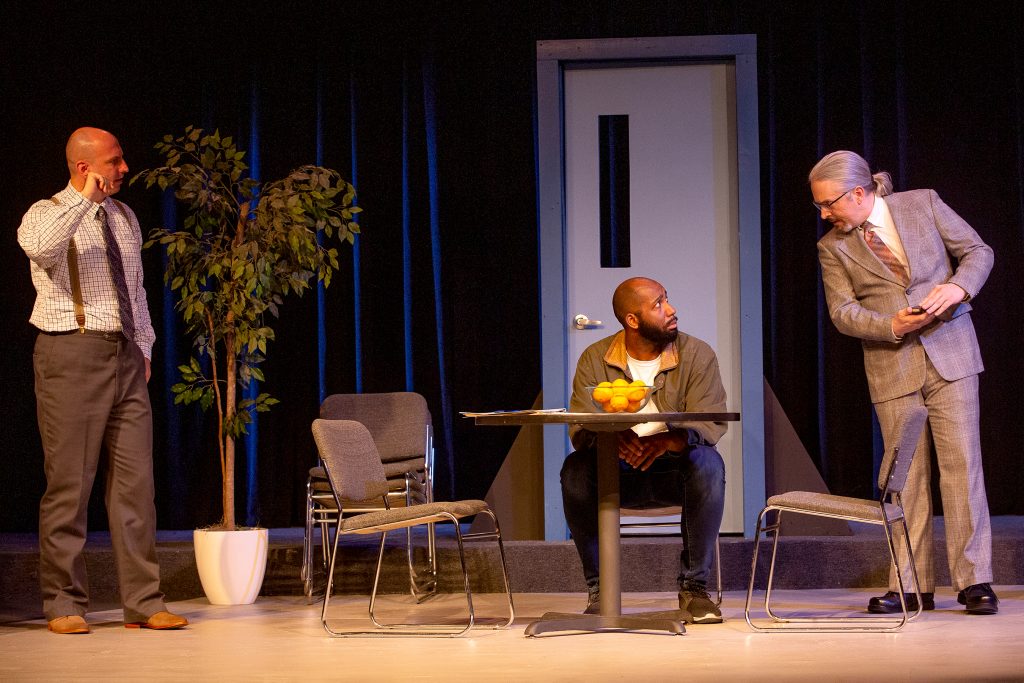By Lynn Venhaus
A classic murder mystery always seems like a wise wintertime choice, and inside Tower Grove Abbey, a pair of novice innkeepers welcomes six strangers to their cozy Monkswell Manor guesthouse. Let the secrets unfold and the ear-piercing screams commence, for Agatha Christie’s “The Mousetrap” is an absorbing time-tested whodunit that Stray Dog Theatre aims to polish until it’s gleaming.
As well it should. This well-cast and well-acted ensemble honors the Grand Dame of suspense’s longest-running play in the world by injecting some spry bits of humor, corralling the momentum of this cleverly constructed drama.
In the remote English countryside, a snowstorm is raging while a young married couple, Mollie and Giles Ralston (Claire Coffey and Sean Seifert), nervously prepare for their first visitors, who are an eclectic and mostly eccentric group, with a few hiding sordid pasts that eventually will be revealed.
The colorful cast includes neurotic Christopher Wren (Jayson Heil), snooty Mrs. Boyle (Julie Healey), steadfast Major Metcalf (David Wassilak), reserved Miss Casewell (Shannon Campbell), and flamboyant Mr. Paravicini (Matt Anderson), who make grand entrances not unlike Halloween trick-or-treaters in their neon-colored outfits.
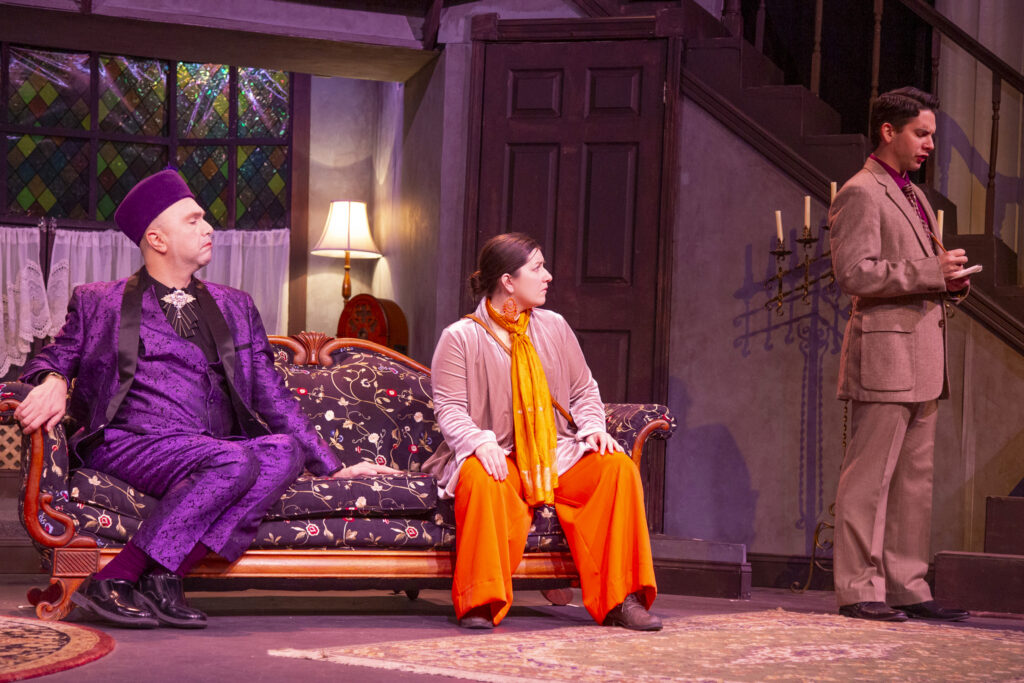
It just so happens that news of a murder in London has spread, and with a killer on the loose – the prime suspect was wearing a dark overcoat (!), nerves start to fray. A determined police detective, Sergeant Trotter (Drew Mizell), unexpectedly shows up to interview the guests, and his interrogations are making everyone nervous.
Could there be a murderer in their midst? It doesn’t matter if you’ve seen this play before or it’s your first time, the intricate plot twists keep one invested.
Director Gary F Bell has astutely focused on the different characters while nimbly moving them around, so the action never dulls. As attention and suspicions shift, the actors crisply deliver their lines with admirable well-rehearsed accents (not all sounding the same either).
The performers memorably personalized their roles, so they each stood out. Heil is a bright spot as chatty Christopher Wren, all nervous energy and exuberance, while Healy purposely annoys as overcritical Mrs. Boyle, who finds fault with their hosts’ inexperience and complains constantly.
Wassilak and Campbell are solid as affable Major Metcalf, a retired Army officer, and stand-offish Miss Casewell, while Anderson is intentionally hammy as the peculiar Mr. Paravicini, exaggerating a strong Italian accent and having fun taunting by repeating “Three Blind Mice,” an ominous earworm.
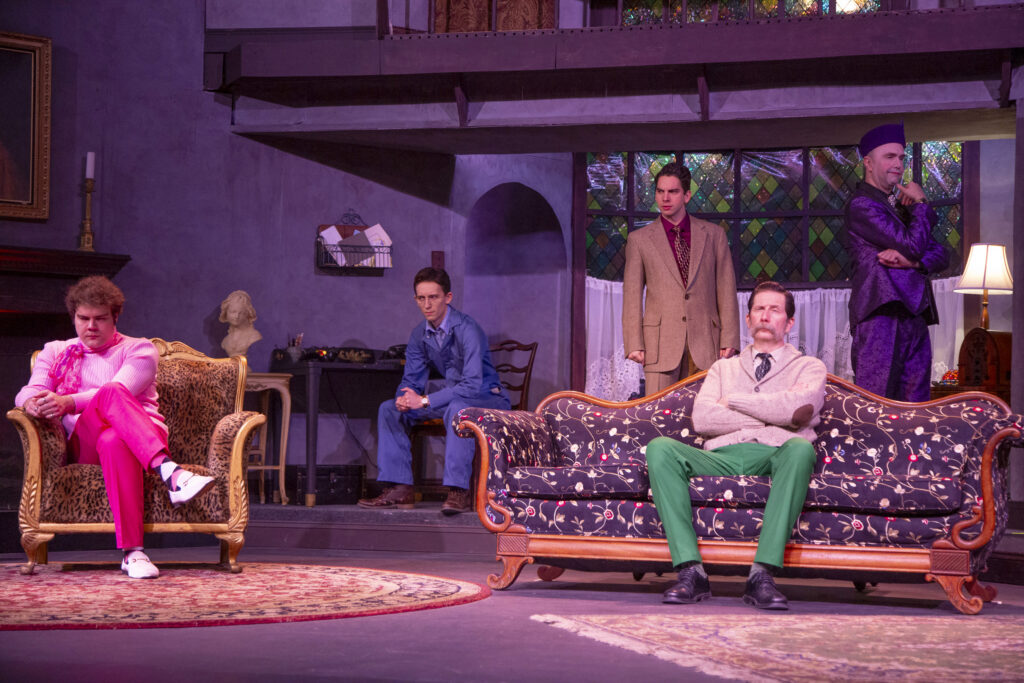
When Trotter enters the room, sniping begins as everyone becomes a suspect, and even the congenial Mollie is caught off-guard by her husband’s jealous behavior. Coffey and ever- reliable Seifert maintain an off-kilter rhythm, skillfully conveying their unease as things go bump in the night.
Mizell is tough as Trotter, his steely resolve evident as he probes the case, asking uncomfortable questions and keeping everyone on edge.
As misery escalates, cracks uncover backstories and highlight current actions, so that the crimes will be solved in what’s considered a brilliant surprise ending.
The program says the time is 1955 in Berkshire, 30 minutes outside of London, but the costumes don’t reflect the period. Instead, they feature a puzzling color scheme comparable to the comic mystery players in “Clue.” Wren could be Mr. Hot Pink and Paravicini as Signore Electric Grape.
It’s a perplexing bold statement costume design by Colleen Michelson. A few outfits are odd choices – Miss Casewell had extra-large wide-leg bright orange palazzo pants that distracted from the action (I was worried she’d be tripped up on the staircase), and Mollie had an unflattering yellow apron to match her too-spring-y yellow dress that looked like a pair of granny panties were attached instead of frilly pockets. .
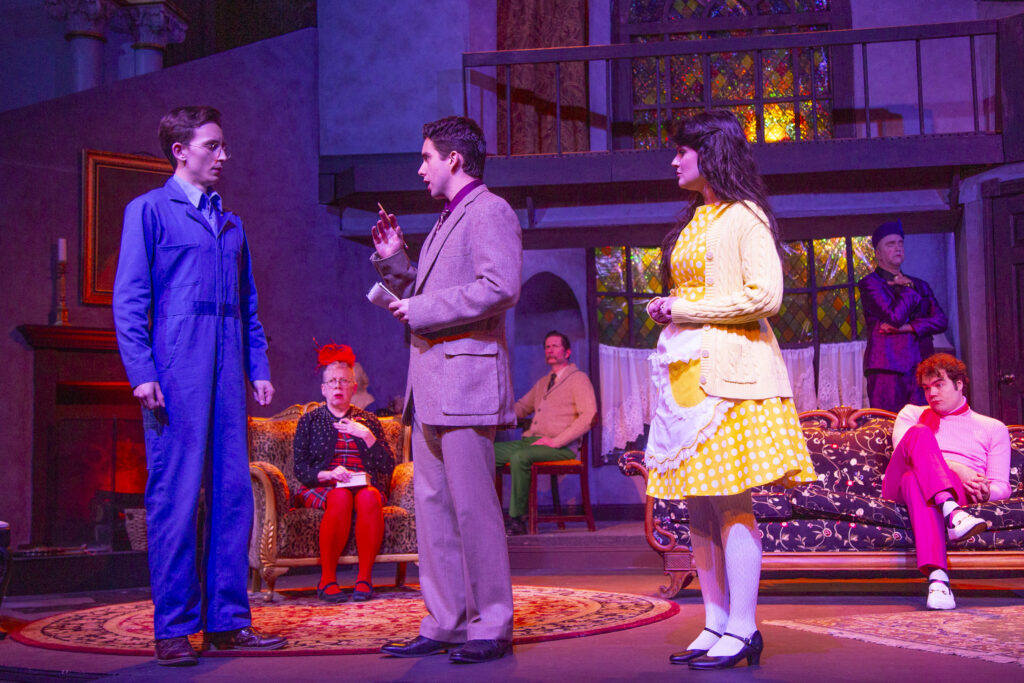
Splendid technical elements added to the unsettling mood, with Justin Been’s impeccable sound design, complete with Bernard Herrmann-like music, and Tyler Duenow’s lighting design made the striking Great Hall set claustrophobic. Designed by Richard Brown and Dominic Emery, the stained-glass window and staircase were terrific additions to the old-fashioned lounge.
A foundation for many other mysteries, “The Mousetrap” premiered on Oct. 6, 1952, and after a brief tour, opened in London’s West End at the Ambassadors Theatre on Nov. 25, where it ran until March 23, 1974, when it transferred to the larger St. Martin’s Theatre, which was next door, and continues to this day. But on March 16, 2020, it was forced to shut down for 14 months because of the global coronavirus pandemic and resumed on May 17, 2021.
Christie based the now iconic play, originally written for radio as “Three Blind Mice” in 1947 and a short story, on the Dennis O’Neill case of foster child abuse — just like the kidnapping in “Murder on the Orient Express” (1934) resembled the Lindbergh baby case, for a reality-based starting off point.
This satisfying production is a fine example of how a 70-something air-tight structured detective fiction can be spruced up and entertain both longtime mystery fans and curious newcomers.
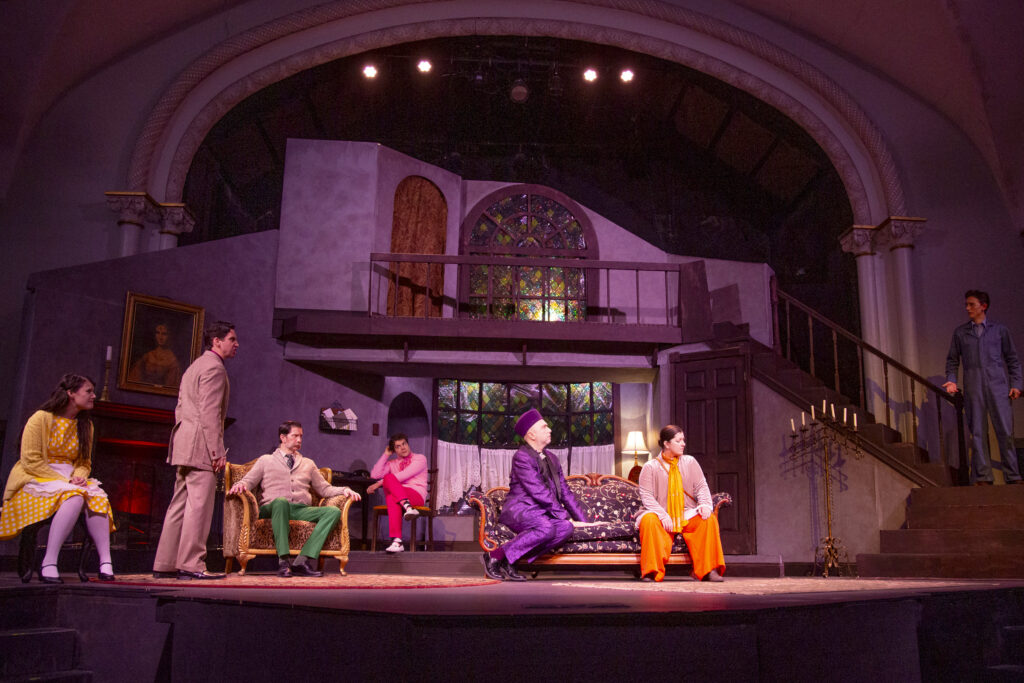
Stray Dog Theatre presents “The Mousetrap” Feb. 1 through Feb. 17 at the Tower Grove Abbey, with performances Thursday through Saturday at 8 p.m. with a special Sunday matinee at 2 p.m. on Feb. 11 at the Tower Grove Abbey, 2336 Tennessee Avenue, St Louis 63104. Gated parking is available. For additional information and ticket reservations, call 314-865-1995 or visit www.straydogtheatre.org. Tickets for adults are $35, with seniors age 65+ and students $30.
ASL Interpretation: The 2/2, 2/9, and 2/16 performances will be presented with ASL interpretation by students from Southwestern Illinois College. ASL interpreted performances are suitable for audience members who are Deaf, deafened, or have hearing loss. They can also be valuable for people who are learning ASL.
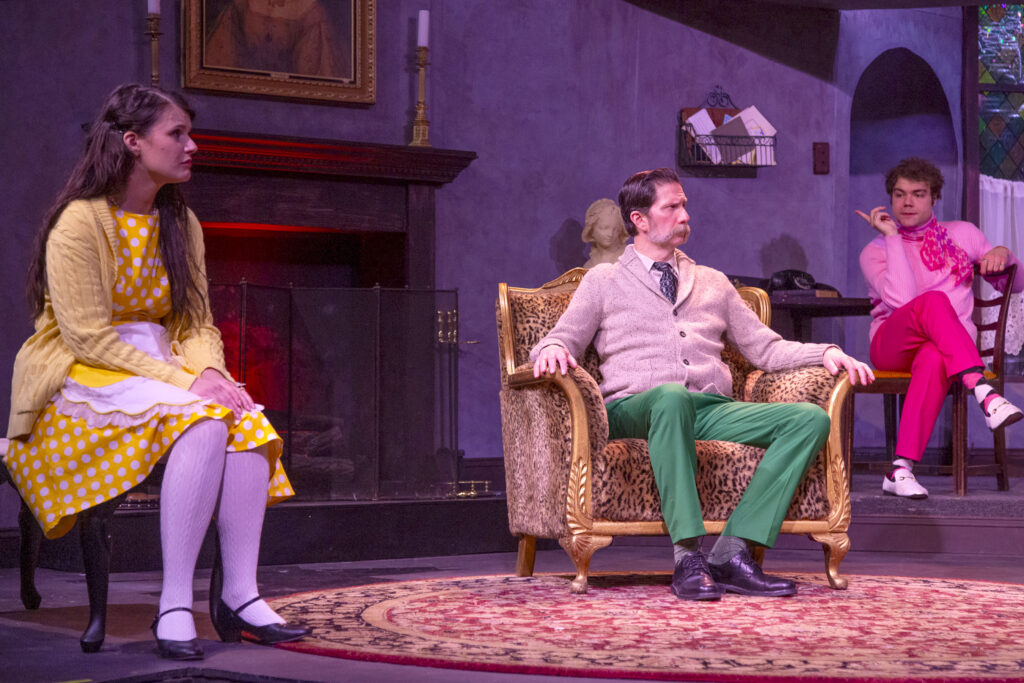

Lynn (Zipfel) Venhaus has had a continuous byline in St. Louis metro region publications since 1978. She writes features and news for Belleville News-Democrat and contributes to St. Louis magazine and other publications.
She is a Rotten Tomatoes-approved film critic, currently reviews films for Webster-Kirkwood Times and KTRS Radio, covers entertainment for PopLifeSTL.com and co-hosts podcast PopLifeSTL.com…Presents.
She is a member of Critics Choice Association, where she serves on the women’s and marketing committees; Alliance of Women Film Journalists; and on the board of the St. Louis Film Critics Association. She is a founding and board member of the St. Louis Theater Circle.
She is retired from teaching journalism/media as an adjunct college instructor.

